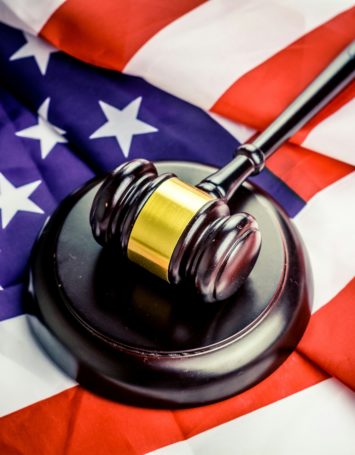Written By: Guy Milhalter and Austin Ochoa
In the United States, anyone who has ever driven a car knows Chevron, the oil and gas company. But for legal professionals, the name Chevron is synonymous with an important legal doctrine —the Chevron deference doctrine. This past June, the U.S. Supreme Court overturned the longstanding Chevron doctrine, a decision that could dramatically reshape how U.S. government agencies operate and how businesses are regulated.
This article delves into the origins and impact of the Chevron doctrine, explores the significant changes brought about by its recent demise, outlines the potential legal and business implications that businesses must now navigate in a rapidly evolving regulatory landscape, and looks at the impact the recent elections in the U.S. will have on the post-Chevron regulatory environment.
The Chevron Doctrine: A Historical Overview
The Chevron deference doctrine originated from the landmark Supreme Court decision, Chevron v. Natural Resources Defense Council, 467 U.S. 837 (1984). The decision established a legal principle that courts should defer to administrative agencies’ interpretations of ambiguous statutes they are tasked with enforcing.
This doctrine was built on the idea that agencies possess specialized expertise in their regulatory areas, making them better suited than courts to interpret the complexities of certain laws. Under Chevron, if a statute was ambiguous, courts would defer to the agency’s interpretation of the statute so long as it was reasonable. This approach allowed agencies significant leeway in interpreting and implementing laws, shaping the modern administrative state in the United States.
The Impact of the Loper Bright Enterprises Case
In a significant shift, the recent Supreme Court decision in Loper Bright Enterprises v. Raimondo, 144 S. Ct. 2244 (2024) overruled Chevron, declaring that courts, not agencies, should interpret ambiguous laws unless Congress explicitly grants that power to an agency.
The Loper Bright case involved a group of Atlantic herring fishing companies challenging the National Marine Fisheries Service’s authority to require them to pay for federal observers on their vessels. The Supreme Court ruled that courts must exercise independent judgment to determine whether an agency has acted within its statutory authority, marking a strict return to judicial oversight of agency interpretations.
The Role of Administrative Agencies Post-Chevron
Administrative agencies, like the Environmental Protection Agency and the Securities Exchange Commission, are tasked with enforcing laws in specific areas such as environmental protection and securities regulation. These agencies are granted authority by Congress to create and enforce rules that carry the force of law, often navigating complex technical issues that exceed the expertise of Congress. Chevron historically provided these agencies with the flexibility to interpret ambiguous statutes, reinforcing their significant role in shaping policy through regulations. However, the overturning of Chevron means that courts will now have a greater say in interpreting these statutes, potentially leading to more legal challenges and a shift in how agencies operate.
Business Implications of Overturning Chevron
The decision to overturn Chevron could have profound implications for businesses. With increased judicial scrutiny, there will likely be more legal challenges to agency regulations, leading to greater uncertainty in the regulatory environment. In this uncertain environment, business interests might find it easier to challenge government’s attempts to regulate business.
As recently reported by the Washington Post, as of the end of October, more than 150 lawsuits have been filed directly challenging federal regulatory authority in areas such as climate, labor, health, and education. Businesses and advocacy groups are citing the decision to overturn Chevron to contest a broad array of rules—ranging from wage laws to environmental standards—arguing that federal agencies have exceeded their bounds.
In addition to the regulatory uncertainty post-Chevron, the results of the 2024 elections will likely lead to additional changes. Following the elections, the Republican Party will soon take control of the White House, Senate, and House of Representatives and the U.S. Government is positioned to pursue a deregulatory agenda. This shift may trigger a broad rollback of agency regulations across multiple sectors. While businesses may experience a significant reduction in compliance requirements, at least in the short term, they could also encounter heightened uncertainty as agencies adjust their regulatory enforcement strategies. This shift is likely to encourage businesses to challenge agency actions with greater confidence.
As a recent example, in August of this year, a Federal District Court in Texas set aside the Federal Trade Commission’s Non-Compete Rule that sought to ban the use of non-compete clauses nationwide with few exceptions. The District Court cited the Loper Bright decision in the first paragraph of its analysis and ruled that the FTC exceeded its authority, concluding that the agency lacked the statutory power to implement a non-compete ban of this scope. Although the District Court’s decision is likely to be appealed and the case could very well find its way to the Supreme Court, the decision raises doubt about the ban’s future while highlighting the uncertainty government agencies and businesses face in the regulatory environment following the decision in Loper Bright.
As this wave of litigation gains momentum, clear guidance from Congress will be essential to help businesses navigate compliance and adapt to a regulatory landscape in flux.
What is Next for Businesses
The Supreme Court’s overturning of Chevron may lead to a more complex and contested regulatory environment, making it imperative for businesses to closely monitor judicial interpretations of agency actions and adjust their compliance strategies accordingly.
Here are some common-sense next steps businesses can take post-Chevron:
- Monitor Legal Developments: Businesses (and their counsel) should more closely monitor court decisions that could impact regulatory interpretations in their industry.
- Engage with Legal Counsel: Maintain close communication with legal experts to assess how changes in judicial review might affect your operations. Legal counsel can also provide guidance on navigating new regulatory challenges.
- Advocate for Clarity: Consider participating in industry groups or coalitions that advocate for clear regulatory guidelines. By actively participating in industry associations, engaging with regulatory bodies, and collaborating with other businesses for unified advocacy, you can contribute to shaping clear and stable regulatory environments.



